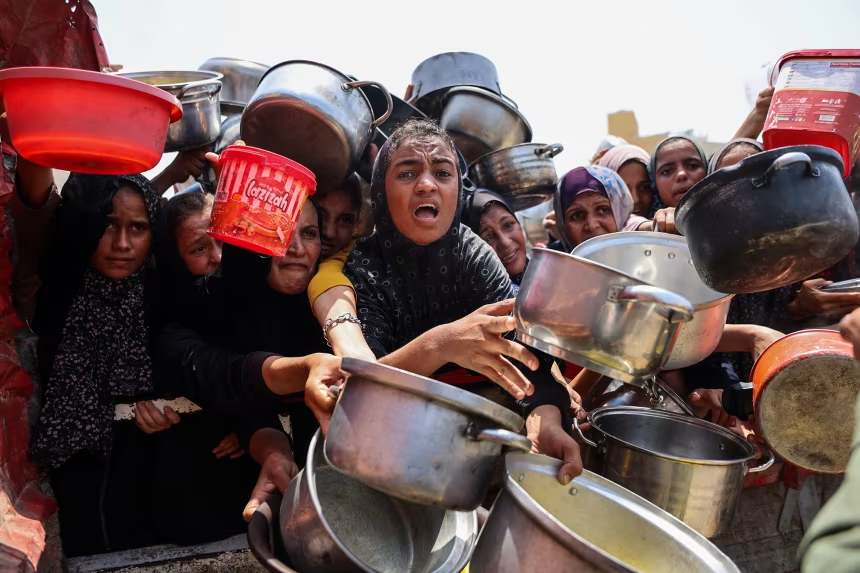A UN-backed report confirms famine in Gaza City, warning of catastrophic hunger among children as the war enters its second year. Israel rejects the findings, citing extensive aid deliveries and accusing Hamas of exploitation.

A new United Nations-backed report has confirmed that parts of Gaza City are now experiencing famine, marking a grim milestone in nearly two years of war. The assessment warns that hunger and malnutrition are expected to expand in the coming months, with devastating consequences for children.
The report, released Friday by the Integrated Food Security Phase Classification (IPC), identifies the Gaza Governorate, which includes Gaza City, as the epicenter of famine conditions. The findings come as Israel intensifies its latest military offensive in the region.
Malnutrition Reaches Critical Levels
According to the IPC, famine has been declared because starvation-related deaths are already occurring and conditions are expected to worsen.
The report highlights that 132,000 children under five are at risk of life-threatening malnutrition through June 2026. Of these, 41,000 cases are classified as severe, nearly double the numbers recorded in May.
The IPC’s findings underscore the collapse of basic infrastructure in Gaza, where repeated restrictions and interruptions in humanitarian aid deliveries have left civilians struggling to access food, clean water, and medical services.
Israel’s Restrictions and the Aid Crisis
Since the outbreak of war, Israel has at times restricted or cut off aid entering Gaza. Humanitarian organizations have repeatedly accused Israeli authorities of weaponizing food supplies as part of its military strategy.
The Gaza Humanitarian Foundation (GHF), a US- and Israeli-backed initiative created to replace a UN aid system long criticized by Israel, has become a focal point of controversy. While designed to streamline aid, its distribution sites have also been scenes of violence. Civilians desperate for food have died not only of hunger but also in clashes or Israeli strikes near aid convoys.
Israel Rejects UN Findings
The Coordination of Government Activities in the Territories (COGAT), the Israeli agency overseeing aid deliveries, dismissed the IPC’s report ahead of publication.
COGAT argued that the assessment relies on “partial, biased data and superficial information originating from Hamas.” The agency further claimed that the IPC ignored Israeli-provided evidence and failed to account for what it described as extensive humanitarian efforts.
Since the war began, COGAT states that over 100,000 trucks of aid have entered Gaza, including food, medicine, fuel, and shelter equipment. Israeli officials insist that “the overall trend has shifted” and accuse Hamas of exploiting humanitarian aid for military purposes.
International Alarm Grows
The confirmation of famine is expected to intensify international scrutiny of Israel’s policies in Gaza. Humanitarian groups warn that the crisis has reached catastrophic proportions, with civilians bearing the brunt of a prolonged blockade, bombardment, and limited access to aid.
UN agencies and NGOs have repeatedly called for a sustained humanitarian corridor to prevent further deaths. However, negotiations remain stalled amid distrust between Israel, Palestinian factions, and international mediators.
A Humanitarian Catastrophe
The IPC’s confirmation of famine highlights the scale of Gaza’s humanitarian collapse. Beyond the immediate threat of starvation, experts warn of long-term developmental impacts on children, a generation already traumatized by war.
With hunger spreading and military offensives intensifying, the people of Gaza face what humanitarian officials describe as one of the most acute food crises in recent history.
The UN-backed famine declaration in Gaza City has deepened global concern over the war’s humanitarian toll. While Israel insists aid continues to flow, evidence of starvation and widespread malnutrition paints a starkly different picture.
As famine conditions spread, the battle over aid access and accountability is likely to intensify, leaving Gaza’s civilians trapped between political disputes and a humanitarian disaster.













Comments are closed.